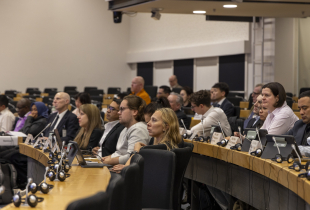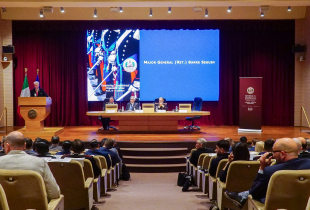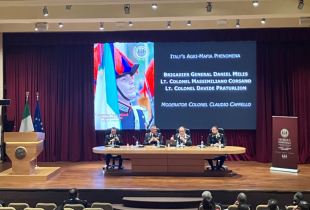
Marshall Center Participants Study Trafficking in Scarce, Protected Resources
By Christine June
Public Affairs Office
George C. Marshall European Center for Security Studies
GARMISCH-PARTENKIRCHEN, Germany (April 14, 2016) – Dr. Timothy Wittig, conservation scientist and senior wildlife trafficking analyst with the Wildlife Conservation Society, talked to participants from the Program on Countering Transnational Organized Crime at the George C. Marshall European Center for Security Studies April 14.
The 84 participants from 59 countries also heard from the Ambassador Douglas Griffiths, Marshall Center’s associate director for International Liaison, about his experiences while working in Foreign Service in Mozambique.
Wittig is a political economist contracted to the Social Science Research Branch at United States Africa Command in Stuttgart, Germany, where he leads a team of researchers focusing on illicit and threat finance issues in Africa and the Indian Ocean region.
Author of the book Understanding Terrorist Finance, Wittig has extensive on-the-ground experience conducting and leading field investigations of illicit economic networks in Africa, Europe, and the former Soviet Union, including those involved in terrorist financing, nuclear smuggling, and, more recently, the illicit trade in elephant ivory and rhinoceros horn in Northern Mozambique and the illicit timber trade in Madagascar.
The second speaker on Thursday, April 14, was Griffiths, who just reported to the Marshall Center in March as the associate director for International Liaison.
Griffiths joined the Foreign Service in 1988 and has served in Quebec City, Canada, Lisbon, Portugal, and Maputo, Mozambique before returning to Washington, D.C. Upon completion of the Department of State’s nine-month economic course, Griffiths worked on the South Africa desk during that country’s transition to democracy.
Held twice a year at the Marshall Center, CTOC focuses on 21st century national security threats as a result of illicit trafficking and other criminal activities.
CTOC began April 6 and will end April 21.
Later this afternoon, participants will hear from Marshall Center’s Program on Cyber Security Studies Professor Phil Lark on cybercrime.
On Friday, participants will learn about “Weapons of Mass Destruction Trafficking” by Supervisory Special Agent Thomas Frye from U.S. Department of Homeland Security, and “Countering Cyber Crime” by Gregory Mounier, from Europol.


